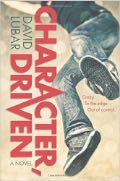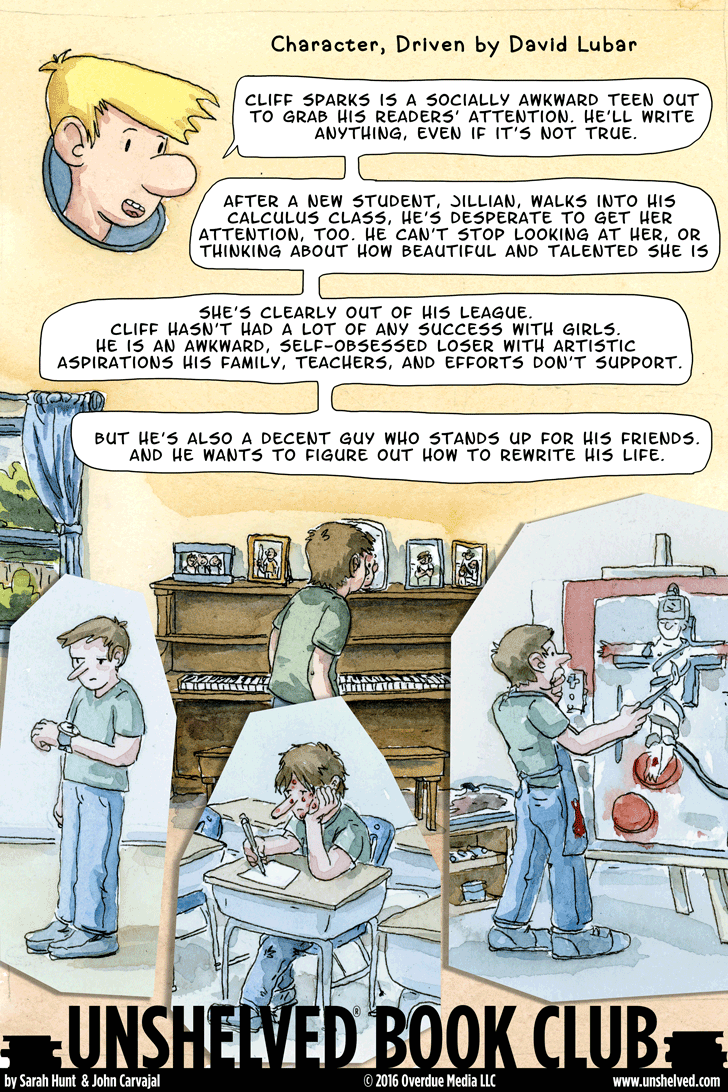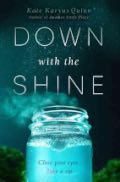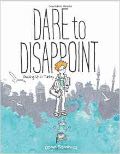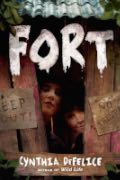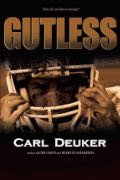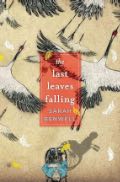Link to this review in the form of a comic strip by geneambaum tagged coming of age
Link to this review by flemtastic tagged fantasy • coming of age
Lennie’s dad, a crime lord, abandoned the family years ago. Lennie’s mom and her three uncles take care of her and their moonshine business. Lennie feels guilty because six months ago her friend Dyl disappeared and was later found dead. Her death has left a huge hole in Lennie’s life and poisoned her relationship with Smith, Dyl’s brother.
Lennie decides to break out of her funk by taking some moonshine to a party. She is toasting partygoers with her family’s salutation — before anyone drinks the moonshine, they must make a wish, then after a sip she repeats the wish and says, “May all your wishes come true, or at least just this one,” then they both take another sip. Feeling sick, she leaves with Smith long before the party is over. The next morning, she gets a call from a friend who is still trapped at the party, manic with worry. Apparently all the wishes spoken at the party have come true. She confesses to her uncles, and Lennie discovers she is just the latest in her family to manifest this wishing talent. Now there is a huge clean-up task, as the mansion of the party has devolved into chaos. There is no possibility of unwishing, and Lennie’s father wants her power for his enterprises.
Why I picked it up: I thought the premise of moonshine-powered wishing was clever.
Why I finished it: The rules of wishing and wish-granting are strict and troublesome. One kid wishes for the Cheetos touch, instead of the Midas touch, leading to several deaths when the people he touches burst into orange powder and Cheetos. Several other wishes are hilarious, like the guy that wished to be old and cool — he is hip, but also 100 years old. Another person wished for the party to never end, which means no one can leave the horror show that is now the party. When Lennie’s father finds her, he is chilling, willing to hurt her or her friends to get Lennie’s servitude.
It’s perfect for: John, because he would love that this isn’t a madcap, funny, wishes-gone-wrong book, but instead, a somewhat crass, twisted book where there are real consequences to people’s wishes and everything doesn’t work out all right in the end.
Link to this review by geneambaum tagged graphic novel • biography
Özge Samancı’s graphic novel describes her childhood and adolescence in Turkey, from the time she wanted to attend school with her older sister in the early 1980s to figuring out what she wanted to do with her life as she finished her university studies.
Why I picked it up: I know almost nothing about Turkey except what I learned from a film about its crazy ’60s and ’70s film culture, Remake Remix Rip-Off. And friends who’ve been there rave about what a great place it is.
Why I finished it: I loved the way Samancı used photos as part of her comics from the very beginning. The book is dedicated to her family, whose heads are represented by two-holed buttons, with bodies and arms drawn on paper underneath them. The buttons add depth to the image, it’s beautiful, and she even manages to get them to express a bit of character.
Because Turkey experienced a military coup in the 1980s and the country had some conservative social elements, it reminded me of my wife’s stories of growing up in South Korea during the same time period: kids were taught to worship the founder of modern Turkey, Atatürk, much as South Koreans were taught to revere King Sejong; school is central, with tests determining one’s future — Özge is actually told she can wet her pants instead of using the restroom during her university entrance exam, since time is so important; and Dallas and Man from Atlantis were popular in both places. (Why was Patrick Duffy, who starred in both shows, so acceptable and popular in countries controlled by the military?)
Readalikes: Marzi: a memoir, a graphic novel about growing up in Poland in the ’80s. Both books are great at hinting at the tough times their narrators are living through as they come to understand how repressive their governments are.
Link to this review by wally tagged coming of age
Wyatt and Augie have a few weeks of summer vacation left, and their plan is to use scrap from Augie’s uncle’s junkyard to build the best fort in the world. Threats by two bullies and the presence of a developmentally disabled teen named Gerard complicate things. Can they outwit the bullies and help Gerard become more confident?
Why I picked it up: After a bunch of literary fiction for adults, I wanted to read something simple and clear.
Why I finished it: I really liked the boys and how their differences made them a stronger team. Wyatt (the narrator) is more of a city boy, familiar with computers, while Augie knows how to kill, clean, and cook a squirrel as well as how to move around in the woods.
It’s perfect for: Susan, who would love how the two friends are, at first, nervous around Gerard, but also indignant at how the bullies have treated him (they made up an insulting song that he sings to himself). She’d really like how Wyatt and Augie help Gerard understand what real friendship is like when they enlist his help in defending the fort.
Link to this review by diane tagged coming of age • thriller
Sixteen-year-old Shay Remby is trying to find her brother Odin, who is clearly in trouble. Odin, an autistic and brilliant hacker, participated in a break-in to a research facility to disrupt the research of a biomedical company and free the test animals. A young girl was killed, and the research that was interrupted was far more sinister than anyone suspected. Now Odin is on the run from Singular Corp’s pseudo-military security forces, who are intent on keeping the public from finding out what happened.
Why I picked it up: I was intrigued by a young adult novel written by John Sandford, whom I know as an author of action-packed adult thrillers.
Why I finished it: I was hooked from the first chapter where a blood-covered Shay is in a cheap hotel, cutting and dying her hair. Shay is a strong, capable young woman who finds allies in a guerrilla artist, a former gang member, a group of street kids, and an insider at Singular. They stay just ahead of the bad guys, garnering enough publicity to keep their cause in the news. As they learn about the real purpose of Singular’s research (transferring memories from ill or old people into younger bodies), Shay and her friends become more of a threat.
The action and violence build to a shocking climax, but the story isn’t finished, so I immediately picked up book two in the trilogy, Outrage.
It’s perfect for: My friend, Bre. She will love the stunts Shay and her friends pull to expose Singular, like stringing lights and anti-Singular banners from the Hollywood sign. And since she’s also a dog lover, she’ll really like the wolf-like X, the dog Odin rescued from the lab, who has extraordinary instincts thanks, in part, to Singular’s experiments.
Link to this review by flemtastic tagged coming of age
Brock is playing soccer in the park when Hunter, the sophomore quarterback at his new high school, calls him over to catch passes. Brock has good speed and a knack for hanging on to Hunter’s spirals, so he tries out for the football team in the fall. He is soon called up to the varsity team. His success on the field is limited — he’s only able to run far down the field on straight routes because he has an aversion to being hit. (This means he can’t catch a crossing ball which would put him in the middle of the field, where linebackers and safeties could hit him hard.) Some of his teammates notice, and they call him “Gutless.” Despite this Brock settles in at school, making a friend in Richie, a relentlessly optimistic Chinese guy bullied by Hunter.
Over the next few years, Richie and Brock become great friends, which is awkward for Brock because he doesn’t know what to do when Hunter treats Richie badly. After Richie joins the football team as a kicker and makes some clutch field goals, Brock hopes that Hunter will stop ragging him. But a crucial error by Richie costs the team a victory and Hunter goes all out to humiliate him. Richie has had enough and responds in a way that will require Brock to take a stand and to be anything but gutless.
Why I picked it up: Carl Deuker is one of the holy trinity of authors of middle school sports books, along with John Feinstein and Mike Lupica. (Tim Green is also making a push to be included, but that would ruin my trinity reference.) Because of Deuker’s Payback Time, Gym Candy, Swagger, and On the Devil’s Court, I always have books to give sports-crazed readers.
Why I finished it: It deals with bullying, school violence, and other serious topics in an enjoyable, sports-based way. I enjoyed the book for its action, and didn’t realize it would switch to the bullying/violence situation until it went there with real emotional power. Richie is a realistic victim of bullying who sometimes draws too much attention to himself, like when he brags about his game-winning field goal in the school lunchroom.
It’s perfect for: James, a student of mine who plays every sport as if his life depends on it, but especially football. (He has won the state title with his high school team the last two years.) Given that Deuker usually sets his books in Seattle, where he has lived and taught for years, this is perfect for him, so the schools and playoff structure that Deuker mentions are what James is already familiar with. I’m sure he’ll see himself in this book.
Link to this review by murphy'smom tagged coming of age
When she was ten, “Alice” had no idea how lucky she was. She had two parents who loved her and plenty of friends. One day her class took a field trip to the aquarium. After a fight with her friends, Alice left the restroom, but she couldn’t find the rest of her class. That’s when she met Ray. He gave her a hat to wear and told her that her classmates were watching a film which she shouldn’t interrupt. He led her to his apartment, where he has kept her prisoner for the past five years.
While she is being beaten and raped, Ray repeatedly tells her he loves her and how lucky she is to be with him. Because he never wants Alice to look older than ten, he only allows her to eat one meal a day. He keeps her on birth control to stunt her menstrual cycles, and forces her to wear little girl clothes and nightgowns with ribbons and bows even though she outgrew them years ago.
Now Alice is fifteen, and she’s getting too old for Ray. He wants her to find a newer, younger girl in the neighborhood park and lead her back to the apartment. He will call her “Annabel.”
Will Alice comply because of her fear of Ray or will she use her visits to the park to escape her captor?
Why I picked it up: I was intrigued by the title because I like the song with the same title by Rob Zombie.
Why I finished it: I didn’t just want to find out if she escaped, I wanted to save her from the monster who continually terrorizes her by threatening to kill her family (he knows where they live).
Readalikes: Unfortunately, this novel reminded me of a few nonfiction books. A Stolen Life by Jaycee Dugard, which bluntly and honestly tells of her years in captivity. Dugard was kidnapped from a school bus stop when she was only eleven and was held for eighteen years, during which she gave birth to two daughters fathered by her captor. Hope: A Memoir of Survival in Cleveland was written by Amanda Berry and Gina DeJesus, who were imprisoned and abused in a basement for over a decade before they managed to escape.
Link to this review by diane tagged coming of age
Sora is diagnosed with ALS (Lou Gehrig’s disease) just before his last year of high school. His dreams of playing baseball and attending the university are dashed when it progresses. Confined to his house, he seeks friendship and human contact through the internet. He makes friends with a girl who is obsessed with anime and a boy who is a budding web designer, but he finds the most consolation in a book of poetry written by ancient Samurai.
Why I picked it up: I like stories about ordinary teens faced with extraordinary circumstances, and I was intrigued by the modern Japanese setting.
Why I finished it: Sora’s first person account of his battle with ALS is funny, touching, and heartbreaking. His relationship with Mai and Kaito grows through their emails and chat correspondence, and eventually they meet in person. Their trips to the park and out for ice cream allow Sora a bit of normalcy and even some fun. And I was intrigued by Sora’s thought process as he tries to decide whether or not to end his life before he becomes helpless.
It’s perfect for: One of my students, Gina, a huge anime fan who will love all the Japanese pop culture references.
Link to this review by wally tagged mystery • coming of age • graphic novel
Everyone at Griswalds Grammar School (a British high school) starts the new year trying to figure out the new kid, Lem. He seems like a nobody and eats raw onions all the time. Other students strangely and suddenly decide he’s fine, but Shauna still thinks he is too boringly weird to be that popular. When Lem invites everyone except Shauna to his parents’ onion farm for a party, she enlists the help of the nerdiest kids in the school to uncover what’s really going on.
Why I picked it up: This graphic novel won a couple of awards (YALSA 2015 Great Graphic Novels for Teens; Publishers Weekly 2013 Best Books for Children), so I read a few pages. Before I knew it, I was hooked.
Why I finished it: The mystery behind Lem’s identity was a compelling plot line that soon becomes outrageous, with a bit of science fiction thrown in, and I loved the characters from all over the school. Shauna is super smart and can conjugate Latin to her teacher, renewing his faith in his students. Little Claire has a lisp and worries about undead “thombies” when they discuss Lem’s hypnotic powers, and whether all the kids under Lem’s spell will eat brains instead of onions. And Lottie has “the attention span of a moth in a light bulb factory,” according to one of their friends.
It’s perfect for: Lily, a seventh grader who would like the dialogue and zingers. When Shauna seeks some advice from Mrs. Beckwith, the wife of one of the teachers, Mrs. Beckwith offers her coffee, declaring it is rocket fuel for the mind. Shauna replies, “Don’t most rockets explode?”
